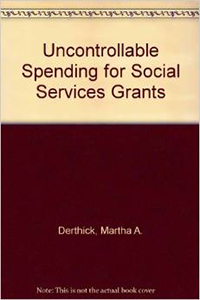Derthick, Martha. Uncontrollable Spending for Social Services Grants. Washington, D.C.: Brookings Institution Press, 1975.
“Uncontrollable Spending for Social Services Grants . . . chronicled not how a high-profile federal initiative had fizzled but rather how an inconspicuous one had mushroomed, way beyond anything that its authors and federal overseers had anticipated. . . . Derthick’s starting point is the 1962 passage by Congress of amendments to the Social Security Act that offered federal matching grants for rehabilitative social services. The legislative language was loose, and the matching grant formula unusually generous, but that did not initially matter much: states did not initially grasp the latitude that it offered to them, and the federal officials who administered the New Deal welfare state monitored the activities of their state counterparts with a critical eye, insisting on fealty to their programmatic preferences. As the Great Society decade proceeded, however, all that changed, as ‘the country was tutored to turn to Washington’ to a far greater degree than before. As part of that process, subnational governments became much more knowledgeable about the federal resources that were available to them, and more savvy about maximizing federal largesse. Also, the ‘deeply held doctrines of public administration’ that had contained discretionary federal grants until now yielded to a more permissive regime.
The culmination of these trends came during Richard Nixon’s first term, when spending on social service grants quadrupled to $1.7 billion: more, Derthick remarks, than NASA was spending on manned space flights or the Army Corps of Engineers on construction. It was not clear, however, that this spending was helping the poor: first, HEW administrators had very little idea what states were doing with the money; second, it appeared that they were mostly substituting federal dollars for state dollars, rather than funding new initiatives. What was clear was that the grants were not achieving their ostensible purpose, namely to restore the dependent poor to self-sufficiency—welfare rolls were exploding in the early 1970s.”
Online:
Amazon

